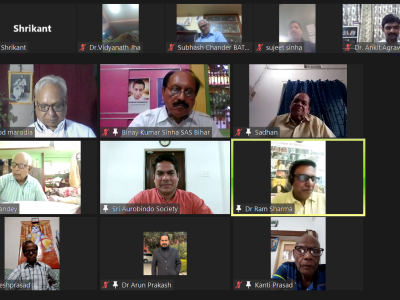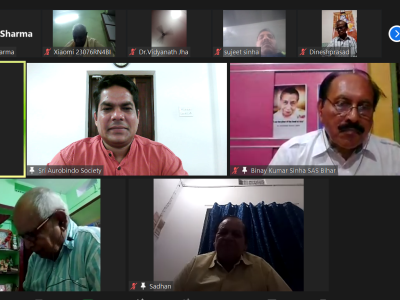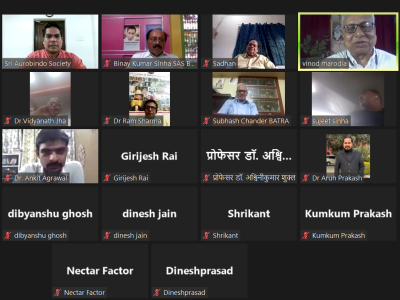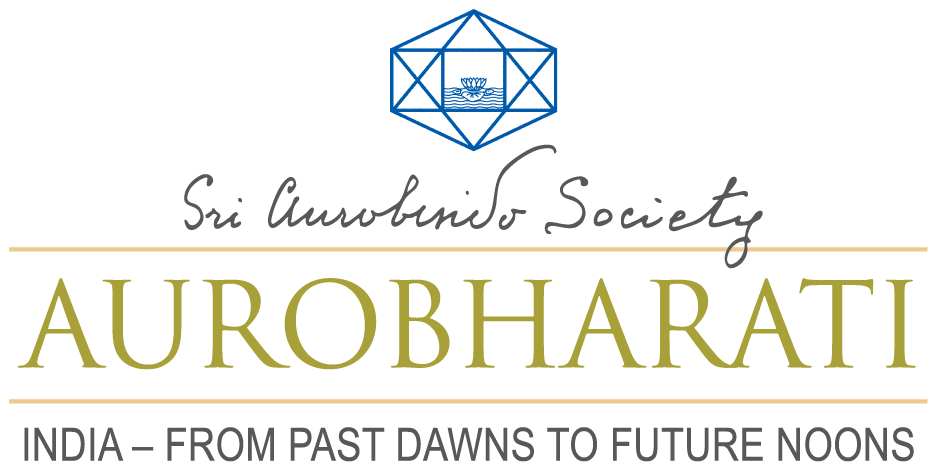Bharat Vaibhav: Diversity of Expressions & the Cultural Unity of India
Location: Online
Institute: AuroBharati
 A widest and highest spiritualising of life on earth is the last vision of all that vast and unexampled seeking and experiment in a thousand ways of the soul’s outermost and innermost experience which is the unique character of [India’s] past; this in the end is the mission for which she was born and the meaning of her existence. – Sri Aurobindo
A widest and highest spiritualising of life on earth is the last vision of all that vast and unexampled seeking and experiment in a thousand ways of the soul’s outermost and innermost experience which is the unique character of [India’s] past; this in the end is the mission for which she was born and the meaning of her existence. – Sri Aurobindo
On the occasion of celebrating Sri Aurobindo’s Birthday & the Independence Day of India, AuroBharati, Sri Aurobindo Society, Union Territory of Puducherry started a new project ‘Bharat Vaibhav. First edition of the Bharat Vaibhav program organized through a symposium on the topic ‘Diversity of Expressions & the Cultural Unity of India’ on 5th September, 2024.
On this occasion, Shri Vinay Kumar Sinha (Secretary, Sri Aurobindo Society, Gaya Centre, Bihar), Shri Vinod Marodia (Founder Member, Sri Aurobindo Society, Dehri-On-Sone Branch, Bihar), Dr Ram Sharma (Principal, SSB PG College, Raniganj, Ballia, UP), Dr Arun Prakash (Essayist, Philosopher), Dr. Ashwini Kumar Shukla, Professor, PJN College, Uttar Pradesh and Dr. Ankit Agrawal (Academician in Tourism, Department of Jiwaji University, Gwalior) shared their views on the topic.
 Speaking on the occasion, Dr Kishor Kumar Tripathy, Member Secretary, AuroBharati, Sri Aurobindo Society, Puducherry said that the culture of Bharat is unique in the world. It represents vast history from thousands of years of its existence including diverse influences and rich traditions. He emphasized the message of Sri Aurobindo about the unity of India “India today is free but she has not achieved unity.” Dr Tripathy mentioned about the message of the Mother about the land of its resurrection “India will be the land of its resurrection – the resurrection to a higher and truer life.” He further said that India is renowned for its enormous cultural diversity, which takes many different forms. Its capacity to incorporate and adjust to a variety of influences while maintaining essential customs. He spoke on the goals and objectives of Bharat Vaibhav, an AuroBharati and Sri Aurobino Society program that aims to explore Indian culture in its many facets in the context of Sri Aurobindo and the Mother.
Speaking on the occasion, Dr Kishor Kumar Tripathy, Member Secretary, AuroBharati, Sri Aurobindo Society, Puducherry said that the culture of Bharat is unique in the world. It represents vast history from thousands of years of its existence including diverse influences and rich traditions. He emphasized the message of Sri Aurobindo about the unity of India “India today is free but she has not achieved unity.” Dr Tripathy mentioned about the message of the Mother about the land of its resurrection “India will be the land of its resurrection – the resurrection to a higher and truer life.” He further said that India is renowned for its enormous cultural diversity, which takes many different forms. Its capacity to incorporate and adjust to a variety of influences while maintaining essential customs. He spoke on the goals and objectives of Bharat Vaibhav, an AuroBharati and Sri Aurobino Society program that aims to explore Indian culture in its many facets in the context of Sri Aurobindo and the Mother.
Speaking about the linguistic diversity of India, Shri Vinod Marodia (Founder Member, Sri Aurobindo Society, Dehri-On-Sone Branch, Bihar) said that while there are many languages spoken in India, a shared understanding of them could foster a sense of unanimity and national identity because of their interconnectedness.
The relevance of teacher-taught tradition and the articulation of ideas through the scriptures were discussed by Shri Vinay Kumar Sinha, Secretary of the Sri Aurobindo Society in Gaya Centre, Bihar. He said that over the millennia, these expressions have played a crucial role in preserving India’s cultural unity.
Dr. Ram Sharma (Principal, SSB PG College, Raniganj, Ballia, UP) stressed the inherent spirit of Sanatana Dharam in the light of Sri Aurobindo, and stated that cross-cultural ties across boundaries demonstrate India’s cultural oneness. He underlined that the revival of Indian culture required an indigenous mindset.
Essayist and philosopher Dr. Arun Prakash focused on India’s sacred landscapes, cultural legacy, and community culture preservation, all of which are vital to preserving the country’s cultural unity.
Dr. Ashwini Kumar Shukla, a Hindi professor at Pt. JN College, discussed the significance of India and Akhanda Bharat in advancing peace and harmony.
 Dr. Ankit Agrawal, a tourism academic at Jiwaji University in Gwalior, focused on the importance of sustainable tourism for community involvement, cultural preservation, and environmental protection. He claimed that in an era where metropolitan culture is developing quickly, it is imperative to protect indigenous culture in order to create a vibrant and varied cultural environment. Significant discussions on the above held during the symposium.
Dr. Ankit Agrawal, a tourism academic at Jiwaji University in Gwalior, focused on the importance of sustainable tourism for community involvement, cultural preservation, and environmental protection. He claimed that in an era where metropolitan culture is developing quickly, it is imperative to protect indigenous culture in order to create a vibrant and varied cultural environment. Significant discussions on the above held during the symposium.
Bharat Vaibhav project will focus on interdisciplinary research on the unique aspects of Indian culture, such as the relationship between culture and civilization, the characteristics of Indian culture with respect to various art forms, the points of diversity and underlying unity, and the relationships between cultures.



